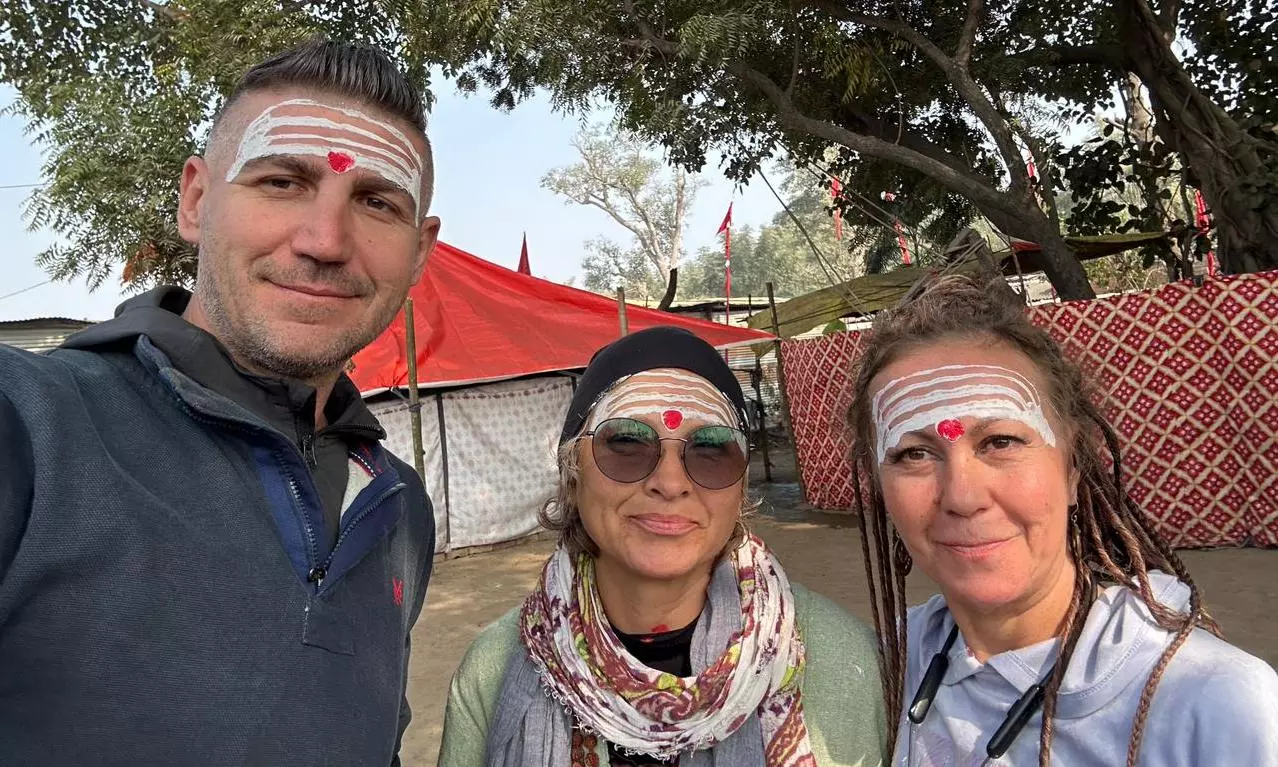Kumbh Brings Russia, Ukraine Together

Hyderabad: Their countries are at war. But, at a makeshift tent at the Maha Kumbh Mela in Prayagraj, Zheina from Russia shares tea with Olena Leshchenko from Ukraine. And Victoria Gerlinsky from Kazakhstan.
Their countries might be caught in the geopolitical wars, but inside their borrowed shelter, there is only talk of camaraderie, and shared humanity. In what is a rebellion against the tide of times, the three travellers have come together in the chaos of a spiritual gathering with nothing but sleeping bags and curiosity.
“For us, this is not about where you come from,” Zheina says, adding. “It is about where you want to go.”
Their tent sits on the grounds of a small temple tucked behind the larger encampments of the Mela. There are no grand facades or manicured spaces here. It is plain, dusty, patched together with canvas and tarpaulin, close to a stack hash stored for the babas who manage the space.
A few scruffy dogs and a cow wander on the premises, unfazed by the human companions. Behind the tent, there’s a rudimentary setup of toilets, the kind you’re grateful for only when nothing better exists.
“We didn’t plan this,” says Zheina, “It just happened. A guru offered us this spot for a small donation. Now we stay here. Together.”
Together. It’s a word they repeat often. Not as a grand statement, but as a practical truth. One might say that in times like these, you don’t ask too many questions, war has a way of making one choose people over politics.
The three met through a series of overlapping journeys. Zheina, who has been living in India for three years, left Russia in search of something that “felt closer to the soul.” Yoga, he says, began as a way to heal his spine but became a way to quiet his mind. Anara, from Kazakhstan, was his yoga student. She introduced him to Yulia, a traveller she met at a retreat in Nepal. The bond between them was immediate, forged by a shared restlessness.
Their days at the Kumbh follow no set schedule. They wake in the first hours of the morning and the thin walls of the tent do little to block the morning chill. Breakfast is chai and whatever bread they can find at nearby stalls. They spend hours walking through the festival, through crowds, pausing at prayer circles and occasionally sitting by the river in silence. “You don’t need to do much here,” says Zheina. “The place does the work for you.”
Calling Kumbh a living contradiction, Zheina notes that it is loud, chaotic, and unapologetically crowded, but it provides him with a kind of peace he struggles to articulate. “In Russia, we don’t have anything like this,” he explains. “There is no place where so many people come only for spirituality.”
The Mela is indeed overwhelming at first. However, between the chaos, there is a rhythm, a sense of belonging that can seep into the cracks of even the most jaded soul. “I don’t understand everything,” he admits, “but I feel it.” The Kumbh for Zheina and his friends is not about theology. It’s about something more visceral. “In Russia, I went to church but never felt connected. Here, I just… know.”
The tent they call home is shared with other travellers, some Indian, some foreign, all looking for something they can’t quite name. There’s no privacy, no luxury, but also no complaints. “We’re used to hard beds,” says Zheina with a shrug.
Their evenings are spent talking, not just to each other but to anyone who wanders by. Conversations range from yoga and spirituality to politics and war. “We don’t avoid the topic,” says Zheina, “but we don’t let it define us either.” The Kumbh, they say, is an experience they’ll carry long after they leave.
In a few days, they’ll catch a train back to Goa, where Zheina will return to teaching yoga and the others will decide their next steps. But for now, they are here.

